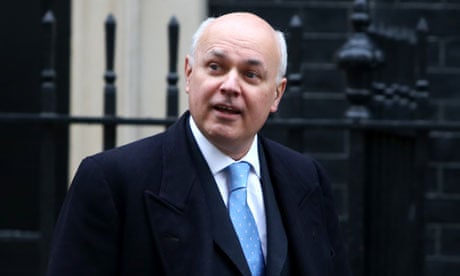The work and pensions secretary, Iain Duncan Smith, has been challenged to prove that he can fulfil his claim that he could live on £53 a week in benefits.
Defending the vast array of welfare reforms being introduced this week as part of the government's deficit reduction programme, Duncan Smith was asked on BBC Radio 4 whether, following an example of a market trader David Bennett, he could survive on £53 a week — the amount Bennett claimed he was left with to live on and roughly equivalent to the lowest rate of jobseeker's allowance given to adults under 25.
"If I had to I would, "Duncan Smith replied. His claim prompted an online petition calling on him to prove it that chalked up 25,000 signatures in its first day.
It follows an interview on Sunday by Grant Shapps, the Conservative party chairman, in which he cited the fact that his two sons shared a bedroom at his four-bed home, in defence of the so-called bedroom tax.
Duncan Smith earns £1,600 a week after tax as a cabinet minister and his travel fares would cost £20 or more from his home to Westminster.
Several MPs including most recently the shadow culture minister, Helen Goodman, have tried to live on minimum means. Goodman tried to spend a week last month spending no more than £18 a week on food, the amount she claims will be left for some of her constituents once they have lost some of their housing benefit due to the so-called bedroom tax.
Years ago, Mathew Parris, then a Conservative MP, lived on benefit for a week for TV programme World in Action.
Duncan Smith admitted that the overall welfare bill is rising if pensions are included, but insisted that the working-age welfare bill will fall by the end of the parliament.
Defending the welfare reforms that begin this week, he said: "We are in an economic mess. We inherited a problem where we simply do not have the money to spend on all the things people would like us to do. What I am trying to do is get this so we don't spend money on things that are unfair."
Duncan Smith urged critics of the so-called bedroom tax to get the issue in perspective, arguing that there was already no funding for extra rooms when people received housing benefit to rent privately.
"They are exactly the same group of people," he said. "The reality is taxpayers are subsidising people to live in these homes. They need to be reassured."
The minister said the housing benefit bill had doubled in 10 years under Labour, and a quarter of a million people were living in overcrowded social housing.
"What I am trying to do is at least use the money we have got to be fair," he said. "What we are trying to do is get control of the welfare bill … without actually slashing or attacking people, we are trying to reform and change it."
As many as 660,000 social housing tenants are deemed to have a spare room and will lose an average £14 a week.
Changes to council tax benefit will see bills for an estimated 2.4 million households rise an average £138 a year, with two million paying for the first time, an anti-poverty group said.
Shapps was also under pressure to justify claims that more than a third of people who were on incapacity benefit dropped their claims rather than complete a medical assessment, according to government figures.
It was claimed 878,300 chose not to be checked for their fitness to work under tests brought in when the benefit was replaced by employment support allowance in 2008. But the figure takes no account of those that did not take a test because they found work or became better, and assumes all were motivated by a desire to avoid questions that would reveal they had no incapacity.









Comments (…)
Sign in or create your Guardian account to join the discussion